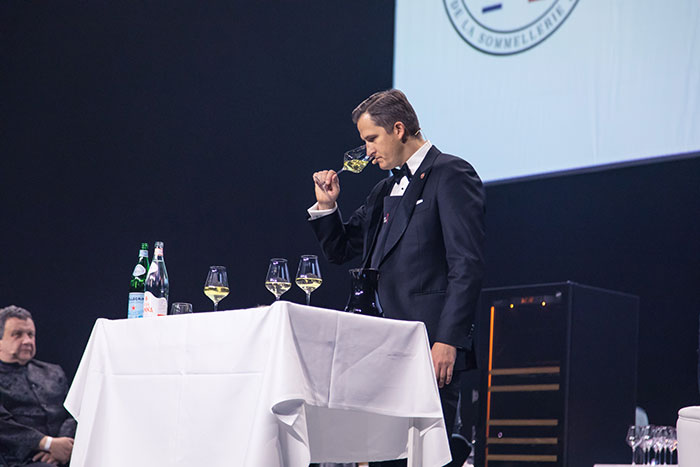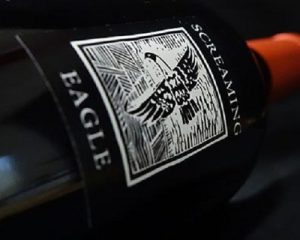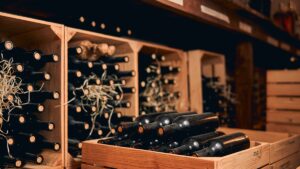
Who took the title of the Best Sommelier of the World? iDealwine was lucky enough to attend the competition and this is what happened.
Before being crowned the Best Sommelier of the World, you first have to make it through an obstacle course that tests your knowledge of wine, the market and your service skills. The international contest takes place every three years with contestants from all four corners of the map. The competition requires a colossal amount of knowledge, endurance and tenacity, people skills and, of course, an olfactory memory like no other. The candidates must first go through national selection before arriving in the final which was held in Paris this time. Candidates from 67 countries took part in quarter finals and semi-finals before the final round. The contest was split into three parts: difficult theoretical questions, blind tasting and situation simulation (serving, managing, and selling wine). What is more, it wasn’t just limited to the world of wine with other tasks testing the contestants’ knowledge of spirits, mixology, and no and low alcohol drinks.
The final took place on Sunday 12 February in a Parisian rugby stadium whose pitch had been covered and set up to look like a restaurant for the event. The three finalists were put through their paces in front of over 3,000 people, serving a dozen of the world’s best sommeliers, celebrated tasters and Masters of Wine acting as customers in the simulations. A lot of pressure was on their shoulders to say the least…
The three finalists were Nina Jensen from Denmark, Raimonds Tomsons from Latvia, and Reeze Choi from China.
Standout moments
The candidates were certainly put through their paces during the contest with tricky situations arising during the service simulation. Imagine decanting a magnum of a Bordeaux grand cru only to discover that it was not from the vintage shown on the menu! And when it came to blind tasting the white wines, there was not a French wine in sight. The contestants did not know that, of course, and suggested that there could have been a bottle from Sancerre, Chablis, and Bordeaux. In reality, there were two Rieslings, one from Germany and the other from Austria, and two Sémillons, one from South Africa and the other from Argentina.
The organisers had another trick up their sleeves for the red wine blind tasting. Each candidate had to describe and sell two red wines to the audience. What they didn’t know was that they had two bottles of the iconic Petrus in front of them from different vintages (2012 and 2003). A brilliant twist for the final, but it was also a shame that they did not work it out.
A task appreciated by the iDealwiners present
There was one exercise that was enjoyed by those from iDealwine present. The contestants had to identify the mistakes on a wine list. It required substantial knowledge of wine and its market. Some of the errors arose from the vintages proposed on the list. There simply hadn’t been a vintage from the producers in the years written as was the case for Krug Clos du Mesnil 1978, Sassicaia 1969 and Vega Sicilia 2001. The jury also slipped in errors in the difficult-to-pronouncing names of Egon Müller’s wines. Some cuvées were attributed the incorrect regions for example, Chilian Almaviva (Maipo Valley) or the Australian Malbec from Wendouree (Clare Valley), and even the Chinese spirits Moutai, Kweichow WuXing which doesn’t come from Hunan but Guizhou, as we learnt on the day. Some pricing errors were also included on the wine list. There was a Château Margaux 1983 priced at €250 a bottle but those present from iDealwine knew that this beautiful vintage from Château Margaux is worth more than double that today.
To finish, the three candidates reunited to the podium and had to work out the names of several wine series from visual clues. Hermitage Cathelin from Jean-Louis Chave and Opus One were among the cuvées to be featured in this task.
Latvian Raimonds Tomson comes out of top
Many congratulations to Raimonds Tomsons who was crowned Best Sommelier of the World after standing out with his precision when describing wines and his daring choices when pairing wines with Anne-Sophie Pic’s menu. The Latvian candidate established himself with his clarity, elegance and humour. Well done to runner up Nina Jensen who knew how to charm the audience with her enveloping presence during the service task. Both of them showed remarkable skill under pressure. Reeze Choi gave it his all, particularly during the blind tasting session, but the stress he felt being up on the stage was more evident than the other two finalists. Hats off to all three; it’s not an easy thing to do by a long shot!
Huge respect and well done to all those who took part and a special mention to France’s Pascaline Lepeltier who stumbled during the final task in the semi-final and finished 4th. We should also say that in the same year as preparing for the contest, Pascaline has added extra challenges by opening Chambers, a restaurant in New-York with a natural wine list, and publishing an excellent book, encyclopédie Mille Vignes. Bravo to her!



